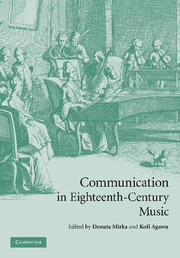Afterword
Published online by Cambridge University Press: 22 September 2009
Summary
Perhaps the most fundamental question to ask about the organizing rubric of this volume is whether music is a system of communication. The answer is almost certainly no. Equally important – and necessary – is to ask whether music has the capacity to communicate. That answer is probably yes. Thus we are caught in a paradoxical situation. Unlike language, music (specifically the art music of the late eighteenth and early nineteenth centuries) does not function primarily as a system of communication. (Even language, for its part, does not function exclusively as such.) Like myth and religion, however, music was sometimes pressed into communicative service, saddled with a communicative function by diktat, made to bear the weight of assigned meanings. Clearly, then, any attempt to read the instrumental works of Haydn, Mozart or Beethoven as continuously meaningful sites for the cultivation of a specifiable, non-trivial content is bound to encounter resistances. At the same time, there is no question that certain aspects of the making and rendering of this repertoire reinforce the belief that there are musical codes to be decoded and signs to be recognized or understood; what is ‘said’ during the course of a composition can at the very least be pointed to, even if it cannot be named precisely.
- Type
- Chapter
- Information
- Communication in Eighteenth-Century Music , pp. 310 - 317Publisher: Cambridge University PressPrint publication year: 2008



